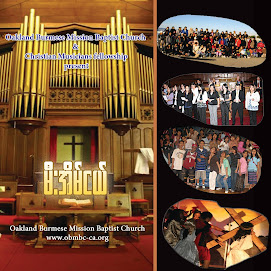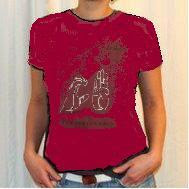
A Waiver From Homeland Security Allows A Surge of Burmese Refugees
-->
New America Media, News Feature, Claire Trageser, Posted: Jan 26, 2008
Editor’s Note: When Homeland Security agreed that some groups against the Burmese military government could be treated as refugees, the small number previously allowed in quickly doubled. NAM contributor Claire Trageser tells one man’s story.
OAKLAND, Calif. - Ba Shar’s 13-year journey from Burma to the United States ended in July when his plane landed at the Oakland Airport. For 12 years, Shar lived in a Thai refugee camp, waiting to get out. Thanks to a waiver to the Patriot Act passed last year his chance finally came.“The opportunity to leave is like winning the lottery, so I had to go,” Shar said using a translator. “I knew that if I stayed, I would be a refugee forever. I’d have no hope, no freedom.”Shar was fleeing the nearly 50-year conflict between the Burmese military and the country’s ethnic minorities, and one of 13,900 refugees who came to the United States last year.
This is almost twice the number in the next largest refugee group, Somalis, and more than eight times the number of Iraqi refugees who arrived here last year.Burmese refugees were not allowed in before because a clause in the Patriot Act bars providing “material support,” including housing, transportation or funds, to anyone from a terrorist organization. In January, the Department of Homeland Security waived this clause as it applies to some of the groups they’d previously listed as terrorist, including groups opposing the Burmese military government. This waiver allowed a surge of Burmese refugees to enter the United States last year.
In the past five months, the International Rescue Committee, a refugee advocacy organization, brought Shar and 109 other Burmese refugees to the Bay Area, compared to 56 refugees in the last two years, said Leslie Peterson, the deputy director of the San Francisco IRC.So Shar’s quick flight out of Burma and then his long wait in one of the nine Thai refugee camps is a typical one, says Peterson.Now 45 years old, Shar was a rice farmer when he was captured by the Burmese military in 1984. He knew he might be used for the dangerous work of searching for landmines, so he and two friends fled the military camp and ran for Thailand.“We risked our lives, but we thought it was a good risk,” he said. “We were carrying ammunition and we just dumped it and ran for our lives.”When Shar made it to the Maelah refugee camp on the Thai border, he sent for his wife and mother-in-law.“The camp is kind of like a prison,” he said. “You’re not allowed outside it, and there are security police looking, so if you’re caught they’ll send you back to Burma.”Nonetheless, Shar tried to put together a life—working in construction for other refugees who traded with the villages outside, building his own home from woven leaves and bamboo and having four children, who attended a United Nations-run school. But the camp always felt unsafe.“The military could raid at any time,” he said.
In early 2007, he heard that the UN was accepting applications for refugee status, which meant that Shar and his family could perhaps move to Australia, the United Kingdom, the Netherlands or the US.“It didn’t matter where we went, as long as we escaped from refugee life,” he said.Shar applied and was granted refugee status. “When we found out, many people were afraid to leave,” he said. “But I knew I had to go.”A snag in Shar’s plan quickly appeared. Shar’s mother-in-law was sick and unable to travel. In order to not lose his chance Shar and the children applied separately from his wife and mother-in-law. Separate sponsors means separate locations. Although his whole family would be allowed to leave, Shar and his three children ages 18, 16 and 14, would be sent to Oakland, while his wife and mother-in-law would go to Georgia. Their oldest daughter, 23, and her fiancé filed a separate application. They left in June for Virginia. Shar and the children left in July and his wife and her mother left in late September.
When Shar and the children arrived in Oakland, the San Francisco International Rescue Committee helped arrange a subsidized apartment, enrolled them for food stamps and public school and gave Shar English lessons and help finding a job.An IRC caseworker also told Shar about a Burmese church near his new home. Raised as a Christian in Burma, Shar went to a service and found a community of other refugees with stories similar to his own.During his first week in Oakland, church members arrived on his doorstep with 50 pounds of rice and a gallon of cooking oil in tow and have continued to help with food, clothing, and education services. “I knew (the United States) would be a different country, a different culture,” he said. “But I found my own countrymen here, which made it a lot easier.”
Two of the eight Burmese groups that the government defines as terrorist organizations are made up largely of Karen and Chin people, two ethnic minorities in Burma. So the waiver has allowed mostly Karen and Chin people to come to the United States. These naturally tight communities often revolve around churches. The Burmese population is 89 percent Buddhist, though many Karen and Chin people are Christian. Christian missionaries focused on these groups, because they are often marginalized in Burmese society, said Penny Edwards, a South and Southeastern Asian Studies professor at Univ. of California, Berkeley who specializes in the cultural history of Cambodia and Burma.
The First Burmese Baptist Church of San Francisco, established in 1977 after the first wave of Burmese arrived, eventually had to open a sister church in Oakland. The Oakland Burmese Mission Baptist Church helps the new arrivals adjust to life.
“We had a vision to start a new church in the East Bay,” said Lone Wah Lazum, the Oakland pastor. “This is an opportunity to reach out to people here, give assistance to people here, and also for these people to come to know Jesus as their Lord and Savior.”For Shar, the church has also been a lifeline to education and work.“When I moved here, I thought I would have a lot more difficulties,” said Shar on a recent Sunday after church. “But finding this place, being with my people, it made it better. Then I had a feeling that things would be OK.”
By mid-October, Shar was working at a jewelry factory in Oakland and had saved $312 for one-way tickets for his wife and mother-in-law. Now his focus is on his children.“For my future, I can’t do much, but my children can be more successful,” His goal leaving the refugee camp, he says “was to give them education.”After his initial adjustment, Shar is confident he will be able to succeed without assistance from his church and the IRC.“Whatever other people do, I should be able to do,” he said. “When I look at other immigrants and refugees, I see people have been able to improve their lives, so I believe I should be able to do that, too.”
Source taken from New America Media : http://news.newamericamedia.org/news/view_article.html?article_id=9afcede5353c8f03e245503f0b7b5e0f












1 comment:
Story like this ... need to be heard ...
Thank Claire for your writing ... and thank Ko Ba Shar for sharing with us your life story ...
Ko Ba Shar's family has been truly blessing to my life. Their humbleness ... their gratefulness ... their faithfulness ... so inspring ... Thank you ...
Post a Comment